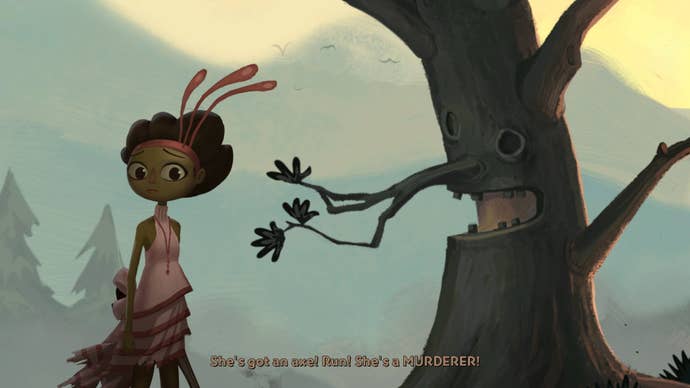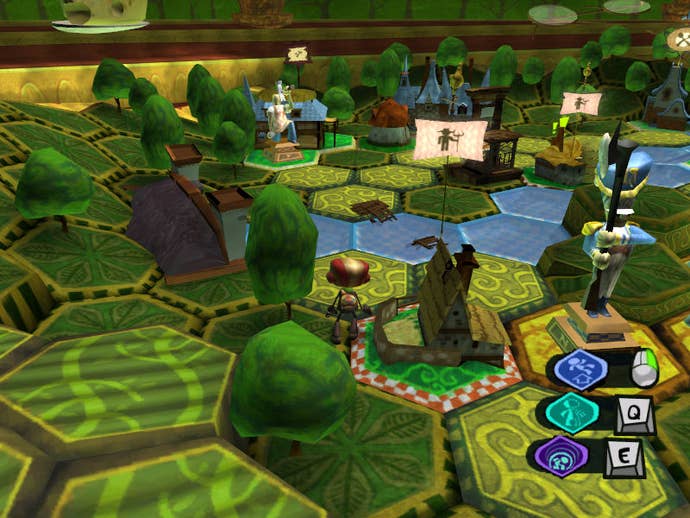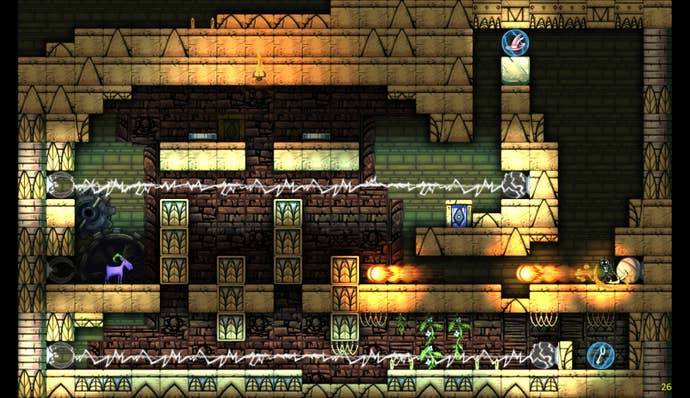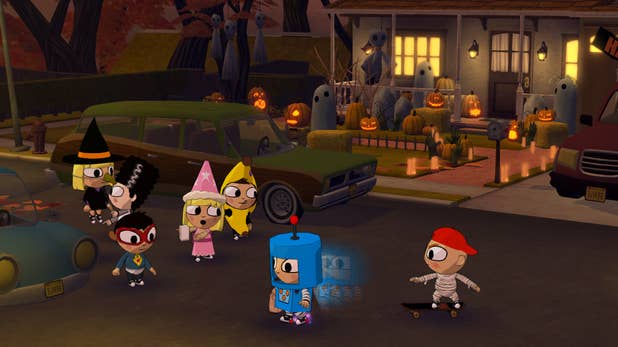Double Fine Publishing: Fighting to Keep Indies From Becoming the "New Casual"
Chief operating officer Justin Bailey on helping indies stay indie with Double Fine Presents.
This article first appeared on USgamer, a partner publication of VG247. Some content, such as this article, has been migrated to VG247 for posterity after USgamer's closure - but it has not been edited or further vetted by the VG247 team.
When you think of publishers, you think of the businessmen that back creative minds with money and make sure the game gets released as a purchasable product. You think of all those dry words I have to type occasionally: IP, brand, contract, etc. Perhaps you're reminded of those publishers who keep franchises you'd love to see again in storage or leave behind loyal fans for the broadest audience possible.
Double Fine isn't aiming to be that kind of publisher.
Two weeks ago, Double Fine surprised everyone by announcing that it was publishing MagicalTimeBean's Escape Goat 2. While the company has self-published a number of its own titles in recent years, this marked the first time it's handled someone else's game. Even more surprising was the announcement that Escape Goat 2 wouldn't be the last indie game published by Double Fine.
I decide to reach out to Double Fine and see how this new initiative started and where it's going in the future. Upon receiving my call, Double Fine Productions' chief operating officer Justin Bailey does not immediately hang up on me - success! - and he's kind enough to answer a few questions.
Making Things Up as They Go
According to Bailey, the entire publishing initiative wasn't a big plan that Double Fine Productions planned out on Excel spreadsheets and whiteboards. Instead, he says the whole process was very organic, noting the short turnaround in partnering with MagicalTimeBean and publishing Escape Goat 2.
"With [MagicalTimeBean lead and Escape Goat creator Ian Stocker] and Escape Goat 2, it came together very quickly," tells me on the phone. "The whole Escape Goat deal came through during the week of GDC. We shot [the promo video] on Friday and the 2 Player guys processed it during the weekend."
Bailey explains that Double Fine invited a few indie developers down to its studio during the Amnesia Fortnight 2014 internal game jam in February. The idea was to tap into the local San Francisco indie developer scene; to give those artists a space to work in and a chance for some exposure. Double Fine already had video documentary team 2 Player Productions on site to record the game jam, so why not record some promising indie titles as well?
The offer to have Double Fine step in and provide more help coalesced during the jam and Bailey spoke to some of the devs in attendance to see if it was something they were interested in.
"We were very flattered by people's willingness to be involved in something like that," says Bailey. "Ian was saying he was about to launch his game soon and wanted to potentially be the first title that we would publish externally."
The Best There is at What They Do
The groundwork for such an offer came two years earlier, when Bailey first joined Double Fine Productions. At that time, Double Fine began to look within at the studio's true passions and how they were faring within the classic developer-publisher system.

"Traditionally, we've always owned the IP for our games. One thing that's interesting about that setup is when you have a publisher who's paying to develop a title, if they don't actually own the IP, they're disincentivized to get behind it," Bailey tells me. "It's hit-or-miss. How much will they promote your game? We basically got behind our own stuff. We started very early doing YouTube promotion, social outreach, using Twitter; trying to mobilize our community to get behind it. We'd make our own trailers, we'd do our own press releases. All these things are something the studio is really good at."
With growing experience in promoting its own titles, Double Fine also started handling its own publishing. The studio considers itself "a collection of indies," so as it got better at developing, promoting, and releasing games, it looked back at its roots.
"Tim is very much about helping other indies to succeed," says Bailey. "It was always something we were thinking about in the back of our mind. We had the opportunity; we've been doing all our own publishing now for around two years. We've been expanding our capabilities pretty aggressively."
In the case of Escape Goat 2, Double Fine's experience is already starting to pay off. Bailey declines to tell me how the game is selling ("It's too early to comment on that stuff."), but he outlined a few other benefits. For one, with Double Fine behind it, Escape Goat 2 is seeing more major reviews, meaning the game is now listed on Metacritic. Despite the fact that the service remains controversial, being listed on the site increases visibility.

Double Fine is committed to helping MagicalTimeBean grow its community, but it doesn't expect see huge numbers from the onset; Double Fine's own titles perform solidly over a long period of time, not in huge opening sales.
"The thing that we're good at is not the huge upfront sales spike, it's more keeping things in front of people," Bailey explains. "Tim's games in general have a decent sales spike, but what really sets them apart is that they're 'evergreen' games. They just keep on selling. They have what most people would consider to be a modest launch and then those modest sales stay consistent. A few years later you look at the numbers and cumulatively, that was a hit game."
First Stop or Last Stop?
Things are still early. Despite getting Escape Goat 2 out the door, Bailey insists that Double Fine is still "just trying things out." The studio doesn't even know if the initiative will continue beyond these early releases.
"We think that there's a bunch of things we can do that have been of value to us, but we don't know if they will be valuable for someone external," he says. "We're keeping an open mind on that. It might be a one-off. We've gotten such an amazing response. We've had over a 160 indies contact us with game submissions."
Double Fine is currently looking at indies in the PC/Mac/Linux space, because that's where the company has seen past successes. As the company's console and mobile games continue to launch, Double Fine may revisit those platforms in the future, but right now the publishing initiative is about what the company can offer indies. Even if a great game crosses Bailey's desk at Double Fine, if the studio can't offer any relevant support, then it would pass on the partnership. And Double Fine is only looking for a "handful" of titles, as publishing isn't a "major undertaking" for the studio yet.

Bailey says that one change to the fledgling program is that Double Fine wants to get in on the games it chooses a bit earlier in the process.
"I don't know if we'll ever do that thing we did with Ian exactly again, because that was the first thing," he tells me. "We like the idea that [developers] can come, show their game to us, we can have our artists and designers play the game, and literally give them informal feedback. In the future, we want to be involved with some of the development and potentially some of the fundraising, maybe through helping out with KickStarter. And then have more lead up where we can get people excited in our community."
Double Fine's publishing program has a few big aims, but the primary drive is simple: "Our biggest thing is we want indies to stay indie."
"Our biggest interest is to have a vibrant indie ecosystem," says Bailey. "Our thought is the best people to provide that are going to be the indies. We'd like to help make other indies successful, keep them independent, and have a place where they can go and in turn, help out other indies. That makes the ecosystem stronger."
Fighting the Race to the Bottom
Recently in a post on Gamasutra, the Castle Doctrine creator Jason Rohrer cautioned against indies racing to bottom when it comes to pricing. Rohrer argued that significant ongoing sales devalue indie titles, screw developers, and make player communities weaker. The race to the bottom in pricing could lead to the situation 22 Cans boss Peter Molyneux was talking about when he told CVG the indie craze "won't last". Squeezed by low-price releases, indies may increasingly turn to free-to-play, larger publishers, and less creative ideas to survive in the market.
Bailey believes that Rohrer's argument is a solid one.
"I think what indies really need to watch out for is not becoming the new casual games," he replies when asked about Molyneux's comments. "I don't think that's a problem from the development side. Indies are approaching it as an artform and they're trying to be innovative, but what's happening in the marketplace is indies are being pushed more and more to have a lower price or have a bunch of games bundled together."

"I'd like to fight that," Bailey added. "Double Fine wants to keep indies premium. You see that in our own games and how we're positioning them. We fight the urge to just completely drop the price. That's one of the things we want to encourage in this program. Getting people to stick to a premium price point and to the platforms that allow you to do that."
I ask Bailey my final question, which is actually the reason we're even talking in the first place: If Double Fine is self-publishing and helping other indies publish their games, then why is Costume Quest 2 being published by Midnight City?
"We're not looking to replace... we're trying to augment the system," he replies. "We're making small strides right now. Costume Quest 2 is a high-budget game. It's one that I thought it was best to have a publishing partner who can also spend some marketing funds around it."
"With Midnight City, they're working with us very much like partners. We're not trying to say that publishing is not a good route to go. I think there are some publishing contracts that operate like a partnership and can still bring value to the table, which we're happy to say is the case with Midnight City."
Like what you've read? Then show us some love on Reddit, Twitter, Facebook, or your favorite forum!


